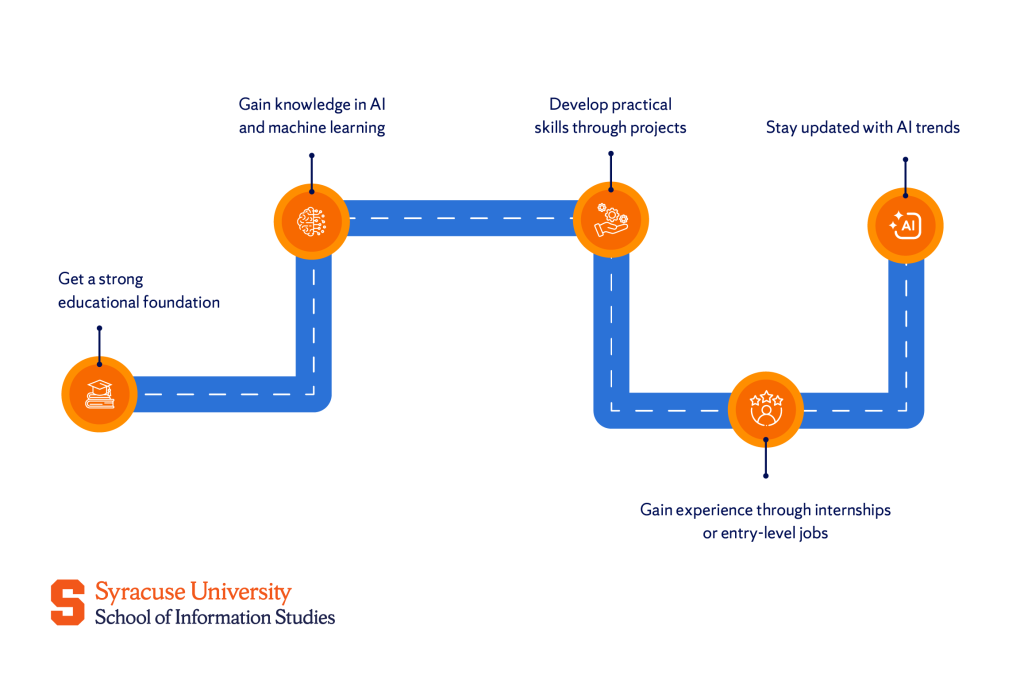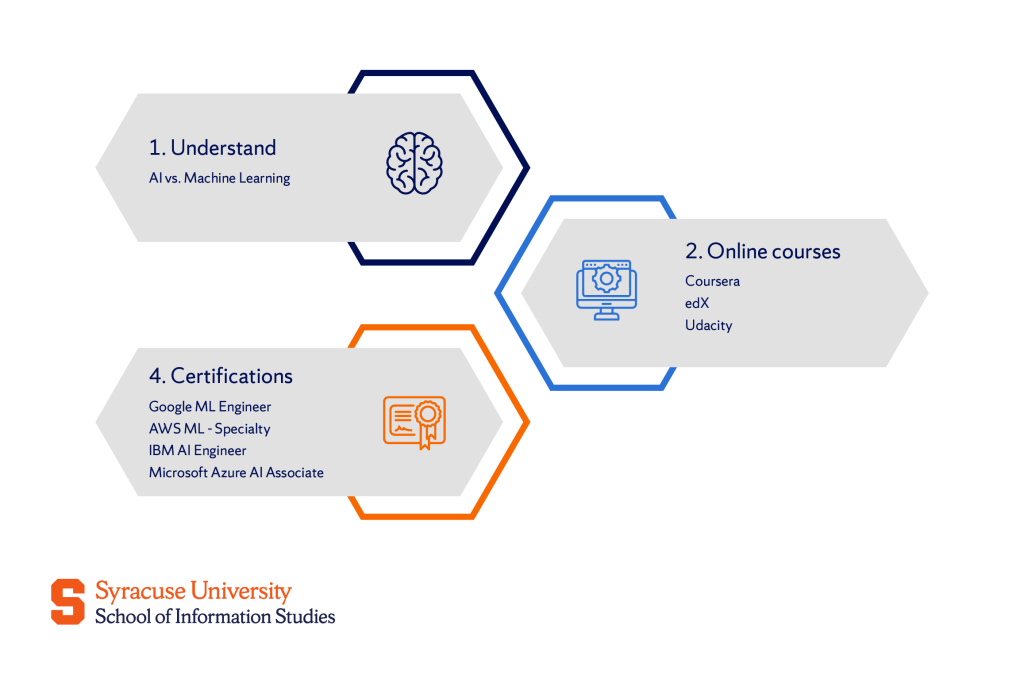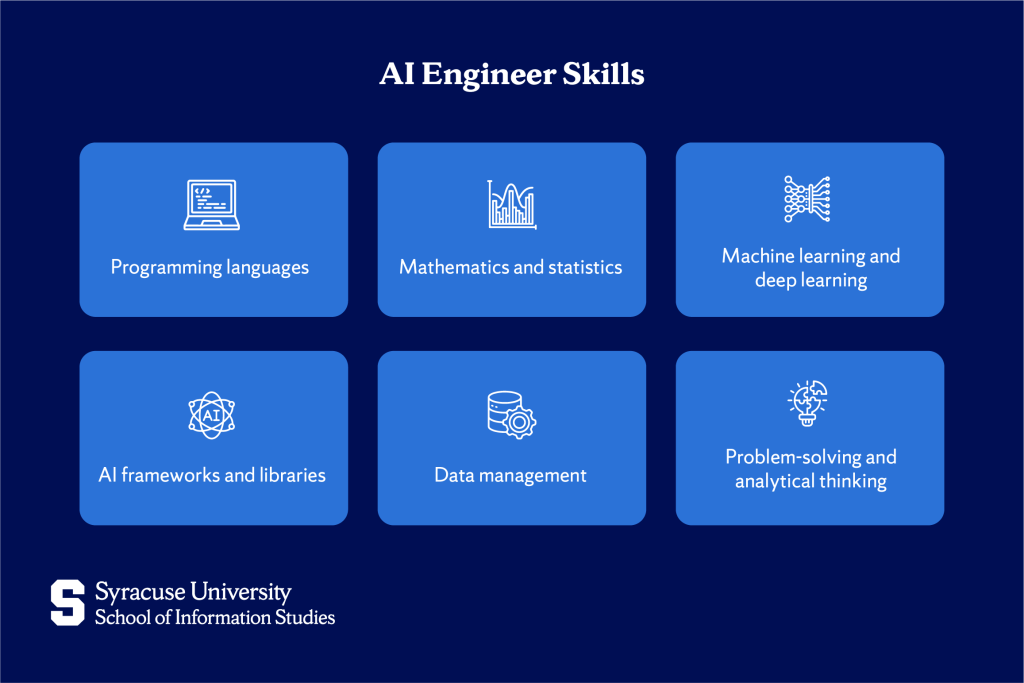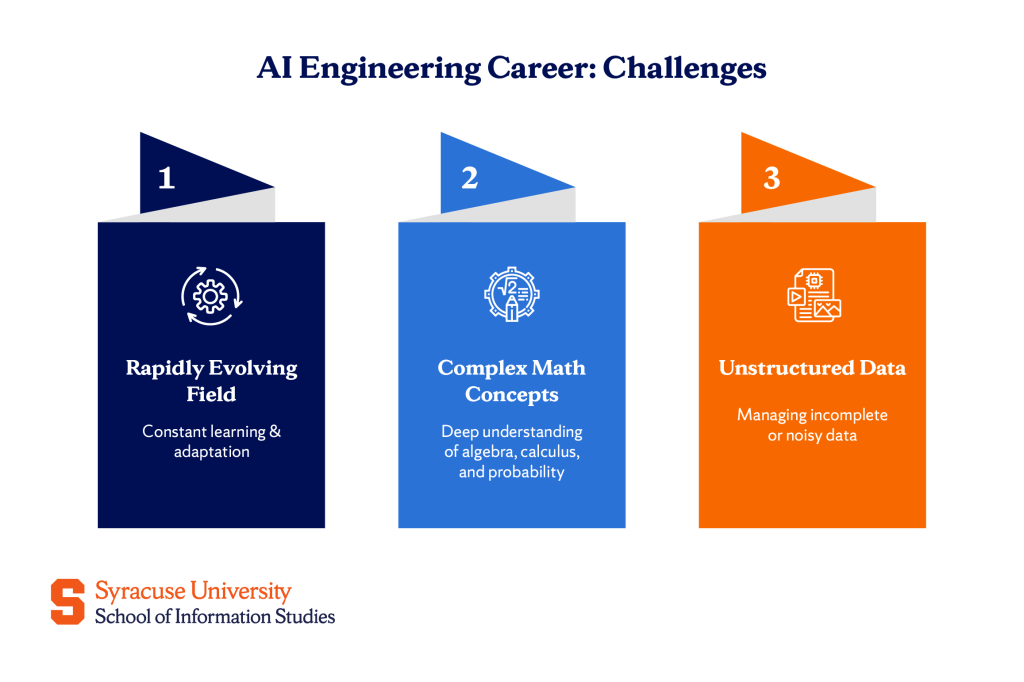Key Takeaways
- Most aspiring AI engineers start with a bachelor’s degree in computer science, software engineering, or data science.
- AI engineers are in demand across a wide range of industries, including healthcare, robotics, finance, autonomous vehicles, retail and e-commerce, cybersecurity, manufacturing, and education.
- Success in AI engineering demands persistence, a strong grasp of foundational concepts, and the ability to adapt to ongoing changes in the AI landscape.
Artificial intelligence (AI) engineers lead the design of smart systems and algorithms that allow machines to perform tasks in human-like ways. The AI engineering market will grow from $3,77 billion to $9.46 billion by 2029 in industries like healthcare, automotive, and finance.
Becoming an AI engineer means developing the expertise to design machine learning models, create neural networks, and develop AI-driven applications that analyze data, make decisions, and learn over time. These skills are especially important as companies turn to AI for real-world problem-solving.
Steps to Becoming an AI Engineer

Becoming an AI engineer begins with a solid foundation in computer science, followed by specialized learning in artificial intelligence and machine learning. Gaining hands-on experience through real-world projects, internships, or entry-level roles is essential, along with staying up to date with the latest developments in the field.
Step 1: Get a strong educational foundation
Most aspiring AI engineers start with a bachelor’s degree in computer science, software engineering, or data science. These programs lay the groundwork for understanding key concepts like algorithms, data structures, and programming languages.
At Syracuse University’s iSchool, students can build on that foundation through interdisciplinary undergraduate programs such as the Bachelor of Applied Data Analytics. This program focuses on data processing, machine learning, and visualization. The Bachelor of Science in Information Management and Technology combines IT, data, and user-centered design for those who want to understand how AI interacts with real-world systems. Additionally, the Applications of AI Minor allows students from any major to explore how artificial intelligence is transforming industries while developing the skills to apply it effectively and responsibly across diverse fields.
For graduate students, the Master’s degree in Artificial Intelligence emphasizes building ethical and real-world AI tools through machine learning, natural language processing (NLP), and UX principles.
Those aiming for research or academic careers can pursue a Ph.D. in Information Science and Technology for a deeper examination of AI-related topics. These can include algorithmic bias, human-AI interaction, and intelligent information systems, contributing to research on AI and data science.
Step 2: Gain knowledge in AI and machine learning
When pursuing a career in AI engineering, it’s helpful to understand the difference between machine learning vs. AI, as this distinction forms the basis for building a strong foundation in the field. Once you’re familiar with the fundamentals, online courses and certifications can provide valuable hands-on experience and theoretical knowledge.
Platforms like Coursera, edX, and Udacity offer high-quality programs taught by industry experts and university professors. A popular starting point is the Machine Learning course on Coursera, which introduces key ML concepts such as supervised learning, neural networks, and model evaluation.
For those looking to go further, the Deep Learning Specialization by DeepLearning.AI offers a comprehensive, hands-on learning path covering convolutional neural networks (CNNs), recurrent neural networks (RNNs), and sequence models.
Udacity’s AI Programming with Python and Machine Learning Engineer Nanodegree are also excellent options for learners seeking a project-based curriculum with personalized mentorship and career support.

Additionally, if you’re aiming for structured, career-aligned certifications, consider programs such as:
- Google Professional Machine Learning Engineer
- AWS Certified Machine Learning – Specialty
- IBM AI Engineering Professional Certificate
- Microsoft Certified: Azure AI Engineer Associate
Step 3: Develop practical skills through projects
Once you’ve built a solid theoretical foundation, the next step is to put that knowledge into practice by working on real-world projects. You can begin with personal AI projects such as building a recommendation system, training a sentiment analysis model, or creating a simple chatbot. These hands-on projects allow you to experiment, make mistakes, and deepen your understanding through direct experience.
Platforms like GitHub are excellent for hosting and sharing your code while contributing to open-source AI projects where you can collaborate with experienced developers and gain exposure to large-scale systems.
Participating in Kaggle competitions is another effective way to test your skills, solve practical machine-learning problems, and learn from a global community of data scientists.
At this stage, building a strong project portfolio becomes essential. A well-documented collection of work, with clear explanations, clean code, and results, demonstrates your ability to turn theory into practice. It highlights your problem-solving skills and gives prospective employers a concrete sense of what you can do.
Step 4: Gain experience through internships or entry-level jobs
Transitioning from academic learning to professional practice requires gaining real-world experience through internships or entry-level positions. These opportunities allow students to understand industry workflows, team collaboration, and production-level machine learning systems.
Interning at tech companies, research labs, or AI-focused startups is a great way to begin applying your skills while learning directly from experienced professionals. Roles like data analyst or machine learning intern can provide excellent hands-on experience with data pipelines, model training, and deployment.
Entry-level positions like junior AI engineer, ML associate, or AI research assistant provide exposure to how AI solutions are implemented within business contexts. Additionally, internships and early career roles help you build a professional network, get mentorship, and receive feedback that helps you grow professionally.
Step 5: Stay updated with AI trends
Staying current with the latest trends, tools, and technologies is essential for long-term success in AI engineering. Following industry publications like Towards Data Science, the Google AI Blog, and OpenAI News helps you stay informed about real-world applications and new developments. Newsletters like The Batch offer specific updates tailored to the AI and machine learning community.
Research papers from arXiv.org, Papers With Code, and journal articles from IEEE provide access to the latest advancements in areas such as NLP, computer vision, and generative AI.
The AI community can also be a major contributor to your understanding and success in the field. Attending conferences like NeurIPS, ICML, and CVPR, as well as participating in local meetups or online webinars, allows you to connect with experts and peers while gaining insights into the field’s direction.
Online communities offer even more opportunities for learning and collaboration. Forums like Reddit (r/MachineLearning), Stack Overflow, and specialized Discord servers give you space to ask questions, share projects, and discuss ideas with others who share your interest in AI.
Essential Skills to Become an AI Engineer
For a successful career in AI engineering, it’s crucial for students to develop a strong foundation in technical and analytical skills. Here are the key areas every aspiring AI professional should master:

Programming languages
AI engineers rely on programming to build, test, and improve models. Python is one of the most widely used languages in AI due to its simplicity and rich ecosystem of libraries. Java and C++ are also essential, especially for high-performance applications and robotics. R is popular for tasks with statistics and data visualization, and it is often integrated into research and analytical fields.
Mathematics and statistics
Understanding how AI works requires strong mathematical skills. Key areas include linear algebra (for working with vectors and matrices), calculus (for optimization and training models), and probability and statistics (for dealing with uncertainties and making predictions). These mathematical concepts are critical in the algorithms used for machine and deep learning.
Machine learning and deep learning
AI engineers must understand different types of AI and learning algorithms. Supervised and unsupervised learning are fundamental approaches for training models on labeled and unlabeled data, respectively. Reinforcement learning, on the other hand, involves systems learning through trial and error to maximize rewards.
To build more advanced AI applications, such as image recognition systems or natural language processing tools, engineers must also understand complex neural architectures, including standard neural networks, CNNs, and rRNNs.
AI frameworks and libraries
To build scalable and efficient AI solutions, engineers use powerful algorithms, frameworks, and libraries. TensorFlow and PyTorch are the leading frameworks for deep learning, offering flexibility and performance for complex model development. Keras provides a user-friendly interface for quickly prototyping neural networks, while Scikit-learn remains a key tool for traditional machine learning tasks. On the other hand, OpenCV is mainly used to process and analyze visual data.
Data management
AI models can be as good as the data used to train them. Engineers must be skilled in cleaning and preprocessing data, handling missing values, and normalizing datasets to ensure model accuracy. Working with SQL databases and managing large datasets are essential parts of the role. Additionally, familiarity with big data tools like Hadoop and Apache Spark enables engineers to efficiently process large-scale data and deal with real-time data streams.
Problem-solving and analytical thinking
AI engineers need the ability to break down complex problems into smaller components, identify patterns in data, and develop innovative solutions. This kind of analytical thinking is crucial when tackling challenges such as improving the responsiveness of chatbots, enhancing recommendation systems, or optimizing logistics in supply chains. Strong problem-solving skills help turn technical models into real results that benefit both businesses and users.
Potential Challenges in the AI Engineering Career

Aspiring AI engineers must be ready for the fast-paced nature of the field and the complexity of the problems they’ll face. Success in AI engineering demands persistence, a strong grasp of foundational concepts, and the ability to adapt to ongoing changes in the AI landscape.
One of the biggest challenges is how rapidly the field evolves. AI remains one of the quickest-growing fields in technology as new tools, techniques, and algorithms continue to evolve. AI engineers must be on a continuous learning path to stay relevant. This means being up to date with the latest papers, conferences, and tools or methods. Adaptability is crucial for AI engineers to succeed and be flexible with any practices that emerge.
In addition to the pace of change, the mathematical depth required for AI can be daunting. The field depends on a strong understanding of linear algebra, probability theory, calculus, and optimization algorithms. These concepts form the foundation of how AI models are developed and refined. Engineers who grasp the math behind the models are better equipped to debug issues, fine-tune performance, and innovate effectively.
Additionally, dealing with unstructured or messy data is often one of the most demanding aspects of AI engineering. Real-world data is rarely clean or complete—it often comes from multiple sources with inconsistencies, gaps, or noise. Making sense of this data and preparing it for use in machine learning systems is a critical skill that can make or break an AI project.
Career Path and Opportunities for AI Engineers
An AI engineering career often begins with entry-level roles such as junior AI engineer, machine learning engineer, or data analyst. These positions typically involve tasks like building models, cleaning and processing data, and collaborating with senior engineers to implement AI solutions. During this stage, professionals begin to develop a deeper understanding of core concepts such as neural networks, deep learning, and natural language processing.
After gaining experience, AI engineers move into mid-level or senior positions and take on more complex projects or even lead smaller teams. Their work expands to include designing complete AI systems, optimizing algorithms, and integrating models into broader software platforms. At this level, engineers also contribute strategically, making informed technical decisions, mentoring junior colleagues, and keeping pace with emerging trends and technologies in the field.
From there, career paths can branch out in different directions. Some professionals transition into research-focused roles, such as AI researcher or research scientist, while others pursue application-based positions like robotics engineer or data scientist. Those with strong leadership and technical backgrounds may move into roles such as AI architect, lead AI engineer, or even chief technology officer (CTO), particularly within AI-focused organizations.
AI engineers are in demand across a wide range of industries, including:
- Healthcare: for medical imaging, diagnostics, and personalized treatment plans
- Robotics: for powering intelligent machines and automation
- Finance: for fraud detection, risk assessment, and algorithmic trading
- Autonomous vehicles: for self-driving cars and real-time decision-making
- Retail and e-commerce: for recommendation engines and customer behavior analysis
- Cybersecurity: for detecting and predicting threats
- Manufacturing: for predictive maintenance and smart production lines
- Education: for personalized learning platforms and virtual assistants
Take the Leap Into AI
Becoming an AI engineer requires a strong foundation in computer science, specialized knowledge in machine learning and deep learning, and experience with real-world projects. As the AI industry continues to grow, those who possess the right skills and adaptability will help shape the future of healthcare, finance, and technology.
At Syracuse University’s iSchool, both undergraduate and graduate students can prepare for the expanding opportunities in artificial intelligence through programs built for the future of the field. The Applications of AI Minor introduces undergraduates from any major to the practical and ethical uses of AI across industries, while the Master’s in Applied Artificial Intelligence provides advanced training in machine learning, data-driven decision-making, and real-world AI implementation. Through access to cutting-edge technologies and interdisciplinary learning, students develop the technical and problem-solving skills needed to thrive in a competitive job market.
So, explore our programs and prepare to lead in one of the most innovative and impactful areas of technology.
Frequently Asked Questions (FAQs)
How long does it take to become an AI engineer?
It typically takes around 3-5 years to become proficient as an AI engineer, depending on the educational background and experience.
What is the average salary of an AI engineer?
The average salary of an AI engineer ranges from $84,000 to $116,500 per year, depending on years of experience and location.
Is it worth becoming an AI engineer?
Definitely! AI engineering provides lucrative salaries, strong career opportunities, and the chance to work on the latest technologies with high salaries.
Is AI engineering the same as machine learning engineering?
Although both positions involve the use of AI, machine learning engineering focuses on developing algorithms, while AI engineering is broader and includes different AI technologies and applications.
